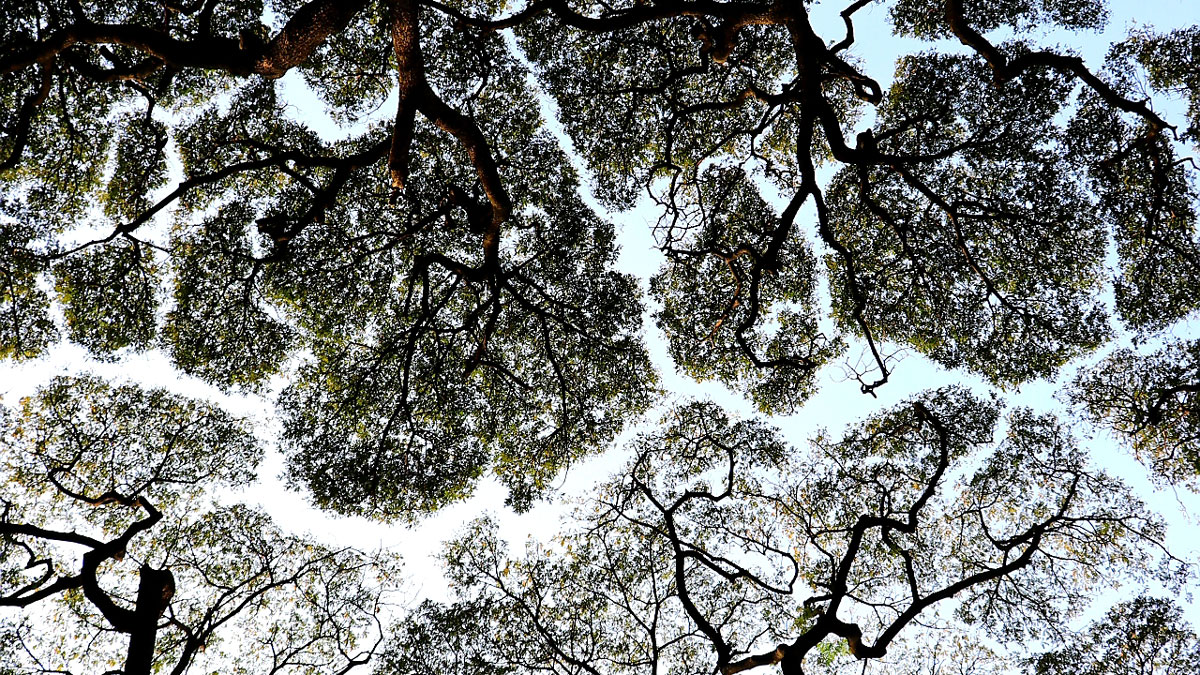There is global demand for data on tropical forests from scientists, governmental and nongovernmental bodies, and businesses like those selling carbon credits. But despite the high demand, people tasked with ground-level data collection are often underprivileged.
Forest data that are open and “findable, accessible, interoperable, and reusable” (FAIR) can be “extremely unfair” to those who actually make forest measurements.
A new paper underscored inequities in data-gathering processes by pointing to how tropical forest data that are open and findable, accessible, interoperable, and reusable (FAIR) can be “extremely unfair” to those who actually make forest measurements—the technicians, field assistants, and students primarily responsible for physically measuring and identifying millions of trees. The paper argued that such processes can be highly extractive when data consumers like scientists from the Global North benefit substantially more from using data (be it for analyses or publication) than data producers from countries that are home to tropical forests.
Oliver L. Phillips, a coauthor on the paper and a researcher in the School of Geography at the University of Leeds, said that people who undertake measurements of tropical forests have “no job security and no idea where the next [opportunity for a] tree census could come from, but they are expected to share data.” Ground-level data originators are also exposed to risks to their lives, with threats ranging from kidnaping and armed insurgents to “narcotraffickers, land-grabbers, infectious disease, snakebite, floods, fire, dangerous transport, and gender-based violence.”
“Most practices in field ecology are like this because no one talks about sharing authorship by incorporating knowledge of field assistants into the research and long-term issues like job security for them,” said Sutirtha Lahiri, a Ph.D. student in conservation science at the University of Minnesota who was not involved in the new research.
In addition to extractive processes of data gathering, Phillips said there is also the potential for misuse of the data. He offered the example of a forest plot with mahogany trees in the Amazon. If precise data about the location of these trees are made open, that would “immediately put at risk a highly endangered tree species [as well as] communities harboring these trees,” he explained.
Financial Security and Equitable, Long-Term Collaborations
FAIR data citations always have their own reference. They provide credit to data originators and are discrete from citations of the paper itself, possibly having separate authorship or author order. In the interest of increased transparency around author roles, some organizations (including AGU) use the Contributor Roles Taxonomy (CRediT) to provide standardized information about contributions: Data originators fall under the “data curation” role.
The new paper, published in Nature Ecology and Evolution, focused on the intersection of data citations and open data. It noted how open data are ideal only in cases in which data origination processes aimed at measuring, monitoring, and sustaining forest science are “secured by large, long-term capital investment.”
In Africa and South America, Phillips explained, the frustration is that people who spend their lives in insecure and dangerous work creating forest data are simply being asked to share them with “more powerful actors” without any reinvestment. Funding, the authors argued, has to cover not simply the direct measurement costs but also investment in scientific training to enable data collectors to become properly included in the scientific process. Such funding could include educational opportunities for local people, which can be particularly transformative for younger generations. “Fundamentally, it’s about moving from an extractive to an inclusive model of forest science,” he said.
There are examples of disparity in the benefits of forest data in India too. In the Western Ghats, “finding multiyear funding for long-term monitoring efforts remains a challenge,” said T. R. Shankar Raman, a scientist with the Nature Conservation Foundation not involved in the research. Investments in infrastructure, digital resources, and support to publish the data in reliable repositories are also scarce.
More broadly, Shankar Raman explained that although India has good scientific resources in the country and is therefore relatively less exposed to precarious global models, there are still “inadequate acknowledgment and support” for data gatherers at the field level, who are often trained members of local communities or forest dwellers whose expertise and skills are vital for data collection.
Those who produce data are often “invisible in the academic world because skills like analysis, writing, and speaking are privileged over producing [foundational] data.”
“The suggestion about developing deep, long-term, and equitable collaborations with [shared] authorship is the strongest one, in my opinion, because it brings up the question of who owns the data,” said Lahiri.
Phillips agreed. Coauthorship is important, he said, because those who produce data are “invisible in the academic world because skills like analysis, writing, and speaking are privileged over producing [foundational] data.”
Other research too has pointed to issues concerning “parachute science,” wherein local scientists and researchers are sidelined in favor of those from the outside. Between 1973 and 2017, only 30% of papers about African Earth sciences in 21 high-impact journals listed an African author. In another case, 40% of publications with fieldwork conducted in Indonesia and the Philippines listed no scientist from the host nation.
Meaningful collaborations in which the input and questions of local collaborators are addressed are key to good research practices, scientists argued. “If I had to restructure the paper,” Lahiri said, “I’d center it around this, because if you center funding, the assumption is that the protocols are already set and you only have to hire people to collect data.”
Until this model changes, Lahiri said, “the power imbalance will continue even if infinite amounts of money are poured in.”
—Rishika Pardikar (@rishpardikar), Science Writer

